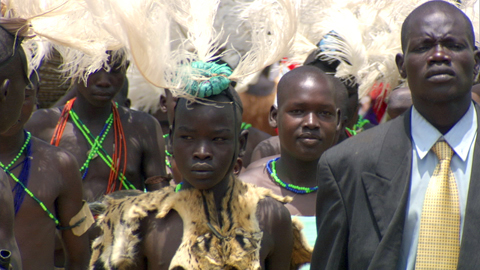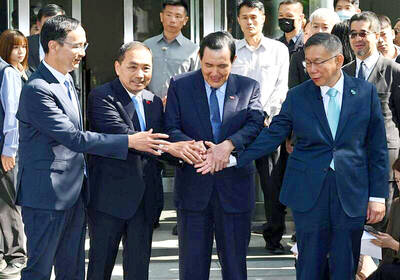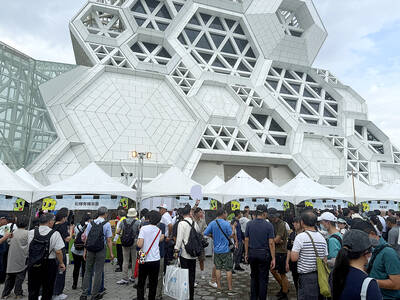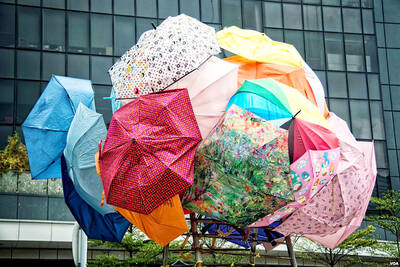War/Dance depicts kids from a war zone who go to the big city to dance for awards. A dancer, a choir singer and a xylophone player share their joy of expression with filmmakers who are just as expressive with their cameras.
Husband-and-wife co-directors Sean Fine and Andrea Nix Fine build a beautiful documentary from elements often favored by nonfiction filmmakers: a hot spot racked with bloodshed, orphans in refugee camps, ravishing scenery and the uplift of watching underdogs onstage vying for the big prize. War/Dance combines all these elements to personalize Uganda’s 20-year civil war and reach transcendence through the perspectives of 13-year-old Rose and 14-year-olds Nancy and Dominic.
“It’s difficult for people to believe our story, but if we don’t tell you, you won’t know,” says Dominic, a xylophonist living in what nongovernmental organizations call an Internally Displaced Peoples Camp, where 60,000 residents are guarded by Ugandan troops. The filmmakers devote little time to life there. Nor do they furnish context for the conflict lasting nearly two decades. Why did “rebels” displace so many civilians in northern Uganda?

Photo: courtesy of cimage
War/Dance, which received an Oscar nomination for best documentary, limits its focus to the personal experiences of three students at the Patongo Primary School inside the camp. In a month, they will board a truck — escorted by soldiers armed with AK-47s — for a two-day trek to the capital city of Kampala for the National Music Competition, the first time this school qualified for the finals. In between rehearsals, we learn the horrific life stories of these three performers from the Acholi tribe. “Since the day we were born, we heard gunshots,” Dominic says.
Four years earlier, Nancy hid in the bush with her young siblings during an attack. Rebels hacked her father apart with machetes, then made her mother pick up his pieces and bury them. When her mother takes her to the overgrown site, Nancy hurls herself on the grave and howls in grief. “This is the bush, Nancy,” counsels her mother. “It’s not safe to cry so loudly here.”
After another attack, Rose asks rebels where her parents are. They point to a pot full of heads. As one of 200,000 orphans in the region, Rose lives a joyless life fetching water, cleaning house, grinding sesame and looking after the children of an aunt who threatens to beat her. Sleep and choral singing are her only escapes.
Everywhere, the threat of physical harm looms. One year, the Lord’s Resistance Army, one of the rebel armies, abducted an estimated 30,000 boys and girls. Dominic managed to escape. Later on, under threat of death, rebels made him beat two farmers to death with their own hoes. “Their legs were kicking, but their heads were not moving,” he tells the camera.
Perhaps helped by the presence of a Western camera crew, Dominic enters the nearby Pader Military Base and asks to meet Sergeant Okello Francis, who was captured from the Lord’s Resistance Army. “Why do the rebels abduct children like me when you know it’s a bad thing?” asks the boy. It’s a wrenching encounter.
Thankfully, Fine and Fine do not play up the movie’s big contest at the National Theatre of Uganda, where 5,000 children dance and sing for three days in eight competitions. Cinematographer Sean Fine shoots over the shoulders of judges, but concocts no phony suspense about the outcome. His keen eye is on the feet and faces of the joyful performers.
Fine’s camerawork — partly inspired by the slick look of films by Michael Mann and Ridley Scott — earned him a Best Cinematography Award at last year’s Chicago International Documentary Film Festival. Dancing between very wide-angle and very long lenses, he frames the aftermath of atrocity with lovely nerve. As one young performer puts it: “You have to be fearless — like a warrior.”

It’s Aug. 8, Father’s Day in Taiwan. I asked a Chinese chatbot a simple question: “How is Father’s Day celebrated in Taiwan and China?” The answer was as ideological as it was unexpected. The AI said Taiwan is “a region” (地區) and “a province of China” (中國的省份). It then adopted the collective pronoun “we” to praise the holiday in the voice of the “Chinese government,” saying Father’s Day aligns with “core socialist values” of the “Chinese nation.” The chatbot was DeepSeek, the fastest growing app ever to reach 100 million users (in seven days!) and one of the world’s most advanced and

Has the Taiwan People’s Party (TPP) changed under the leadership of Huang Kuo-chang (黃國昌)? In tone and messaging, it obviously has, but this is largely driven by events over the past year. How much is surface noise, and how much is substance? How differently party founder Ko Wen-je (柯文哲) would have handled these events is impossible to determine because the biggest event was Ko’s own arrest on multiple corruption charges and being jailed incommunicado. To understand the similarities and differences that may be evolving in the Huang era, we must first understand Ko’s TPP. ELECTORAL STRATEGY The party’s strategy under Ko was

The latest edition of the Japan-Taiwan Fruit Festival took place in Kaohsiung on July 26 and 27. During the weekend, the dockside in front of the iconic Music Center was full of food stalls, and a stage welcomed performers. After the French-themed festival earlier in the summer, this is another example of Kaohsiung’s efforts to make the city more international. The event was originally initiated by the Japan-Taiwan Exchange Association in 2022. The goal was “to commemorate [the association’s] 50th anniversary and further strengthen the longstanding friendship between Japan and Taiwan,” says Kaohsiung Director-General of International Affairs Chang Yen-ching (張硯卿). “The first two editions

It was Christmas Eve 2024 and 19-year-old Chloe Cheung was lying in bed at home in Leeds when she found out the Chinese authorities had put a bounty on her head. As she scrolled through Instagram looking at festive songs, a stream of messages from old school friends started coming into her phone. Look at the news, they told her. Media outlets across east Asia were reporting that Cheung, who had just finished her A-levels, had been declared a threat to national security by officials in Hong Kong. There was an offer of HK$1m (NT$3.81 million) to anyone who could assist